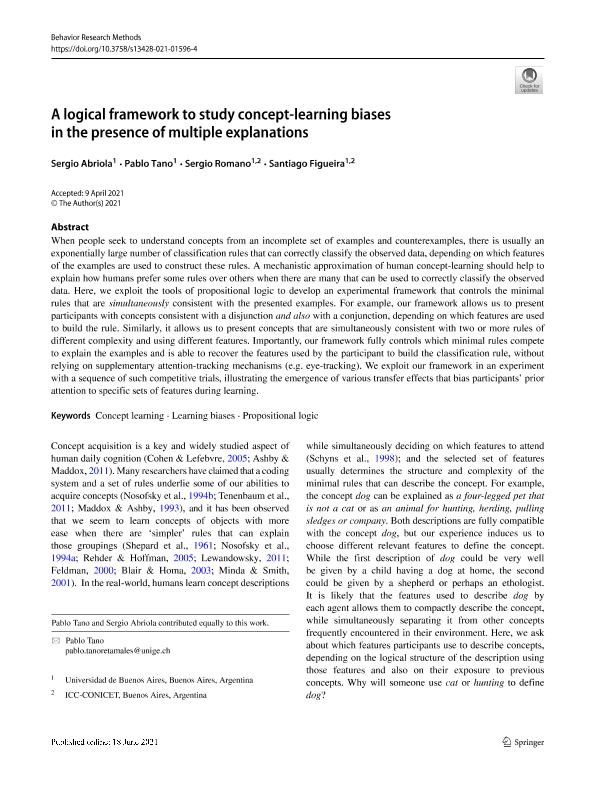Mostrar el registro sencillo del ítem
dc.contributor.author
Abriola, Sergio Alejandro

dc.contributor.author
Tano, Pablo

dc.contributor.author
Romano, Sergio Gaston

dc.contributor.author
Figueira, Santiago

dc.date.available
2022-02-10T10:54:04Z
dc.date.issued
2021-06
dc.identifier.citation
Abriola, Sergio Alejandro; Tano, Pablo; Romano, Sergio Gaston; Figueira, Santiago; A logical framework to study concept-learning biases in the presence of multiple explanations; Springer; Behavior Research Methods; 6-2021; 1-19
dc.identifier.issn
1554-3528
dc.identifier.uri
http://hdl.handle.net/11336/151725
dc.description.abstract
When people seek to understand concepts from an incomplete set of examples and counterexamples, there is usually an exponentially large number of classification rules that can correctly classify the observed data, depending on which features of the examples are used to construct these rules. A mechanistic approximation of human concept-learning should help to explain how humans prefer some rules over others when there are many that can be used to correctly classify the observed data. Here, we exploit the tools of propositional logic to develop an experimental framework that controls the minimal rules that are simultaneously consistent with the presented examples. For example, our framework allows us to present participants with concepts consistent with a disjunction and also with a conjunction, depending on which features are used to build the rule. Similarly, it allows us to present concepts that are simultaneously consistent with two or more rules of different complexity and using different features. Importantly, our framework fully controls which minimal rules compete to explain the examples and is able to recover the features used by the participant to build the classification rule, without relying on supplementary attention-tracking mechanisms (e.g. eye-tracking). We exploit our framework in an experiment with a sequence of such competitive trials, illustrating the emergence of various transfer effects that bias participants’ prior attention to specific sets of features during learning.
dc.format
application/pdf
dc.language.iso
eng
dc.publisher
Springer

dc.rights
info:eu-repo/semantics/openAccess
dc.rights.uri
https://creativecommons.org/licenses/by/2.5/ar/
dc.subject
CONCEPT LEARNING
dc.subject
LEARNING BIASES
dc.subject
PROPOSITIONAL LOGIC
dc.subject.classification
Otras Ciencias de la Computación e Información

dc.subject.classification
Ciencias de la Computación e Información

dc.subject.classification
CIENCIAS NATURALES Y EXACTAS

dc.title
A logical framework to study concept-learning biases in the presence of multiple explanations
dc.type
info:eu-repo/semantics/article
dc.type
info:ar-repo/semantics/artículo
dc.type
info:eu-repo/semantics/publishedVersion
dc.date.updated
2022-01-27T18:16:01Z
dc.journal.pagination
1-19
dc.journal.pais
Suiza

dc.description.fil
Fil: Abriola, Sergio Alejandro. Consejo Nacional de Investigaciones Científicas y Técnicas. Oficina de Coordinación Administrativa Ciudad Universitaria. Instituto de Investigación en Ciencias de la Computación. Universidad de Buenos Aires. Facultad de Ciencias Exactas y Naturales. Instituto de Investigación en Ciencias de la Computación; Argentina
dc.description.fil
Fil: Tano, Pablo. Universidad de Buenos Aires. Facultad de Ciencias Exactas y Naturales; Argentina
dc.description.fil
Fil: Romano, Sergio Gaston. Consejo Nacional de Investigaciones Científicas y Técnicas. Oficina de Coordinación Administrativa Ciudad Universitaria. Instituto de Investigación en Ciencias de la Computación. Universidad de Buenos Aires. Facultad de Ciencias Exactas y Naturales. Instituto de Investigación en Ciencias de la Computación; Argentina
dc.description.fil
Fil: Figueira, Santiago. Consejo Nacional de Investigaciones Científicas y Técnicas. Oficina de Coordinación Administrativa Ciudad Universitaria. Instituto de Investigación en Ciencias de la Computación. Universidad de Buenos Aires. Facultad de Ciencias Exactas y Naturales. Instituto de Investigación en Ciencias de la Computación; Argentina
dc.journal.title
Behavior Research Methods
dc.relation.alternativeid
info:eu-repo/semantics/altIdentifier/url/https://link.springer.com/10.3758/s13428-021-01596-4
dc.relation.alternativeid
info:eu-repo/semantics/altIdentifier/doi/http://dx.doi.org/10.3758/s13428-021-01596-4
Archivos asociados
